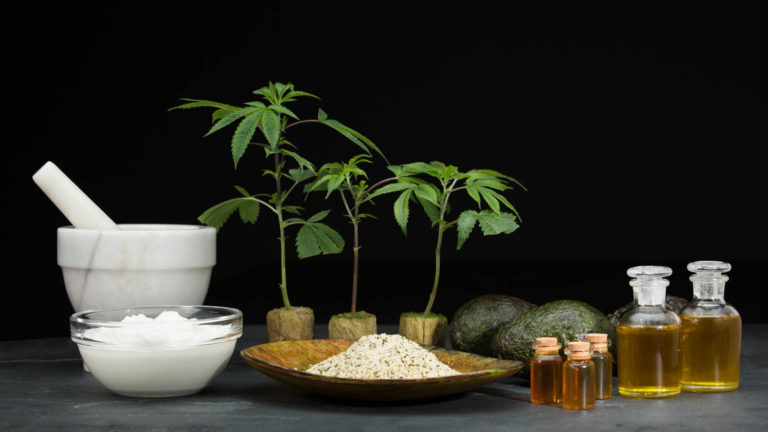Fibromyalgia is a disorder characterized by widespread pain, exhaustion, poor sleep quality, and cognitive difficulties that sufferers often experience as brain fog. It is a contentious condition, with medical experts often disagreeing about what constitutes a diagnosis of fibromyalgia, and some debating its existence at all.
Problematically, the FDA-approved drugs traditionally used to treat fibromyalgia have limited efficacy, with commonly used first-line medications such as duloxetine and pregabalin offering little respite from prevailing symptoms such as pain. Fibromyalgia patients often also complain of side effects associated with these medications.
 Photo by: Gina Coleman/Weedmaps
Photo by: Gina Coleman/WeedmapsImage lightbox

For the estimated 2% to 4% of the global population who suffer from this condition, the majority of whom are women, there is an increasing interest in alternative therapies that may provide relief from the symptoms. Cannabidiol (CBD) oil is currently attracting attention as an alternative form of treatment.
Research overview
There is still no research specifically investigating CBD oil as a treatment for fibromyalgia. However, in 2018 research was published in the “Journal of Clinical Rheumatology” suggesting medicinal cannabis may represent an effective treatment for the illness.
 Photo by: Gina Coleman/Weedmaps
Photo by: Gina Coleman/WeedmapsImage lightbox

There is also a solid body of evidence that indicates CBD may alleviate certain symptoms associated with fibromyalgia, such as pain, sleep disruptions, anxiety, and depression.
The studies
The brain is one of the key areas affected by fibromyalgia, with brain inflammation contributing to pain and brain fog. Recent research suggests that microglia in the brain and spinal cord play a role in fibromyalgia. When certain cells become activated, they can contribute to inflammation by amplifying pain signaling and transmission.
CB2 receptors within the body can modulate microglial cell function. One 2016 study in the Swiss journal “Cellular and Molecular Life Sciences” suggested that therapeutic strategies aimed at CB2 receptors could provide a promising treatment for inflammation. The therapeutic effects of CBD on inflammation have been documented in a range of studies, such as one published in 2015 in the journal “Bioorganic and Medicinal Chemistry.”
In addition, CBD has seems to offer neuroprotective properties and stimulate cell repair in the brain. This could improve brain function in fibromyalgia patients. CBD oil may also diminish anxiety and depressive behaviors by boosting anandamide signaling, according to results of a double-blind, randomized clinical trial published in 2012 in “Translational Psychiatry”. Anandamide is a neurotransmitter that facilitates homeostasis and balanced mood.
 Photo by: Gina Coleman/Weedmaps
Photo by: Gina Coleman/WeedmapsImage lightbox

In addition to helping to ease inflammation in the body, CBD oil may reduce neuropathic pain, which arises from damaged or malfunctioning nerves. Some fibromyalgia sufferers experience neuropathic pain as one of their symptoms.
Fibromyalgia sufferers also often experience difficulty with sleep. In a March 2019 study, published in “Epilepsy Research,” a single, large dose of CBD induced sleepiness among 30% of participants who suffered from treatment-resistant epilepsy. In another clinical trial with healthy volunteers, however, a single large dose of CBD did not create any change in sleep or wake cycles. CBD oil may help fibromyalgia sufferers with sleep, though further research is needed.
Chronic pain is also often accompanied by other conditions: anxiety or depression are present in almost 80% of the chronic pain population. The co-existence of pain and depression is particularly true for fibromyalgia patients. CBD can help alleviate anxiety in this population. In one 2017 human study, 300 milligrams of CBD taken orally caused a measurable drop in anxiety and cortisol levels.
What the experts say
Dr. George Habib is the co-author of a 2018 retrospective review study in the “Journal of Clinical Rheumatology” investigating medical cannabis as a treatment for fibromyalgia, and he believes it offers fibromyalgia patients hope. ”In general, the impression (from the study) was that this type of medication is more effective than pregabalin and duloxetine,” Habib said.
While there is a still a need for larger randomized trials, Habib, a rheumatologist in Netanya, Israel, believes that the research is promising and that it is worth trying medicinal cannabis for fibromyalgia soon after diagnosis, rather than considering it as an option when opioids fail.
Habib does point out that the patients in the study consumed oil containing both CBD and THC extracts. “A small fraction of our patients used oil, and mostly containing THC, so only a very small number of patients used pure CBD oil,” he said.
Dr. Ginevra Liptan, director of The Frida Center for Fibromyalgia and author of “The FibroManual: A Complete Fibromyalgia Treatment Guide For You...And Your Doctor,” reported that many of her patients have experienced relief from symptoms such as muscle tension, pain, anxiety, and insomnia as a result of combining CBD oil with their mainstream medications. Like Habib, however, she emphasizes that CBD oil appears to be more effective when teamed with THC.
 Photo by: Gina Coleman/Weedmaps
Photo by: Gina Coleman/WeedmapsImage lightbox

“CBD oil on its own, without any other medications or treatments, typically does not give strong analgesic effects,” Liptan explained. “Successful pain relief without any additional prescription medications usually requires products that contain some amount of THC in addition to the CBD.”
She, therefore, endorses the use of full-spectrum CBD oils for fibromyalgia. “I see much greater benefit from full-spectrum CBD oils, which contain other cannabinoids and sometimes trace amounts of THC, compared to the CBD isolates, which do not have the synergistic effects of the whole plant extract.”
Liptan also notes that the extent to which patients experience relief varies from patient to patient. Some notice only a mild improvement in their pain, while others notice significant pain relief. While cautious not to depict CBD oil as a panacea, Liptan emphasizes that CBD oil represents a safe form of pain relief for fibromyalgia and that it is definitely worth consideration as a treatment.
Bottom line
There is still a lack of conclusive clinical evidence that CBD oil is an effective treatment for fibromyalgia. However, early studies and anecdotal evidence from patients are promising and indicate that CBD oil, particularly full-spectrum CBD, may reduce pain and inflammation, support healthy sleep, and improve mood.

